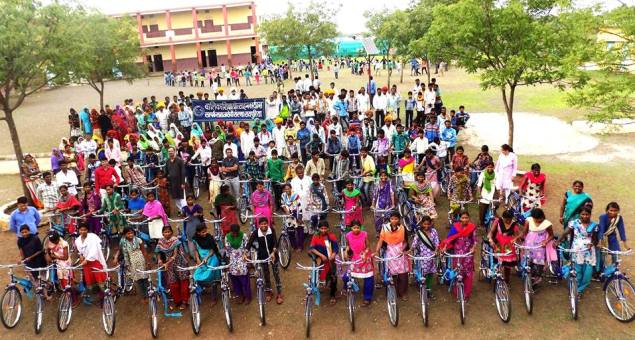Sampark Madhya Pradesh
About Us
 Cheerful girls after getting bicycle in Sampark compound
Cheerful girls after getting bicycle in Sampark compound
SAMPARK was started in 1987 by a few social workers in Petlawad tehsil of Jhabua district and was formally registered in 1990 as a society under the Madhya Pradesh Society Registration Act 1973. The area was chosen because of the nature and intensity of exploitation of the Bhil adivasis, negligible developmental intervention and the limited presence of voluntary groups. Work was started by addressing the survival needs and developmental aspirations of the people. SAMPARK has since gradually evolved into a many faceted organisation tackling the varied problems of the area and has successfully completed a silver jubilee of formal developmental intervention.
The people of the area have also built up a community based organisation to tackle the local and policy level issues called the “Lok Jagriti Manch” (LJM). The Manch has developed into a flourishing community organisation running self-help groups, village watershed development committees, sustainable agriculture groups, poultry farming groups, village health and education committees, forest management committees and conflict resolution groups. A "Saajha Manch" (SM) has been set up to separately address the issues faced by women arising out of the patriarchal nature of Bhil society. The issue of sustainable agriculture and the campaign against genetically modified seeds, which has now assumed tremendous significance, has been addressed by a separate state wide network named Beej Swaraj Abhiyan (BSA). This network undertakes policy advocacy to secure the future of agriculture and food availability locally and globally.
Millennium Development Goals (MDGs) were adopted by the United Nations in the Millennium summit in September 2000 in an effort to make a substantial improvement in reducing poverty, hunger and disease in the developing countries. Targets were set that were to be achieved by 2015. The national development agenda too became oriented around the achievement of these goals as it became clear many of these goals would not be met. So in the last three years leading up to 2015 and the subsequent finalisation of the Sustainable Development Goals 2030 (SDGs), the focus of work in Sampark has been to work for the achievement of these goals locally. Consequently this report is structured around the work done in achieving the MDGs.
The overall goal is the empowerment of the Gram Sabha so that it can fulfil its potential as a tribal self-government institution as envisaged in the Panchayat Extension to Scheduled Areas Act. Since the Bhil Adivasis cannot fund the whole of the development required to achieve this goal from their own resources due to their poverty, these have to be supplemented with external support. Sampark facilitates this external support. All developmental activities are undertaken by the staff of Sampark. The socio-political action is undertaken by the LJM, SM and BSA which are people's organisations whose operational expenses are met by the people themselves.
At present Sampark is operating in Jhabua, Satna and Jabalpur districts and has its main campus in Raipuria village. There is a residential school for 200 children in this campus. It is equipped with solar energy and biogas units and the storm and waste water is treated and reused for drinking, washing and in agriculture to produce vegetables that are consumed in the mess.
For major milestones, please click here.


